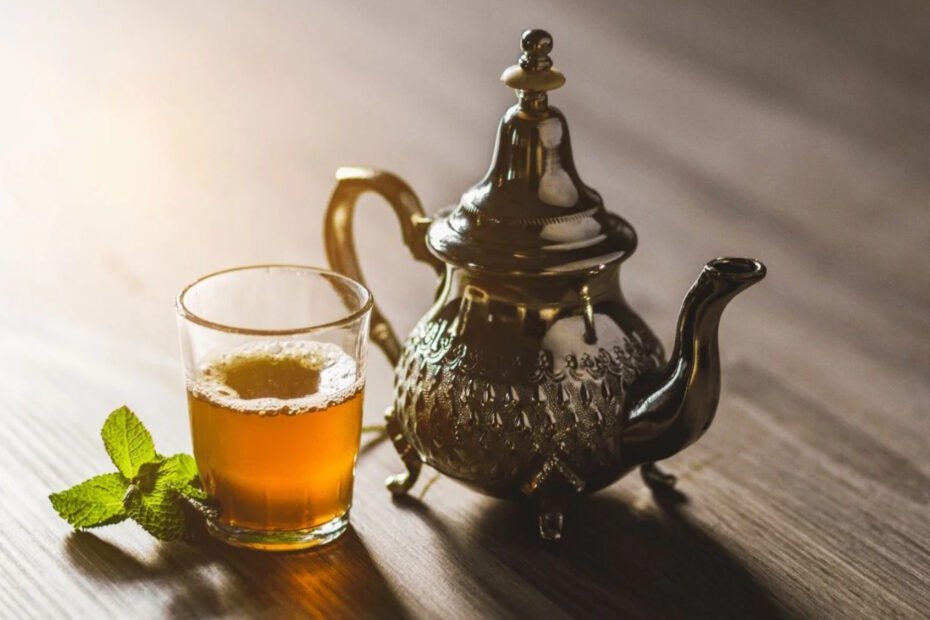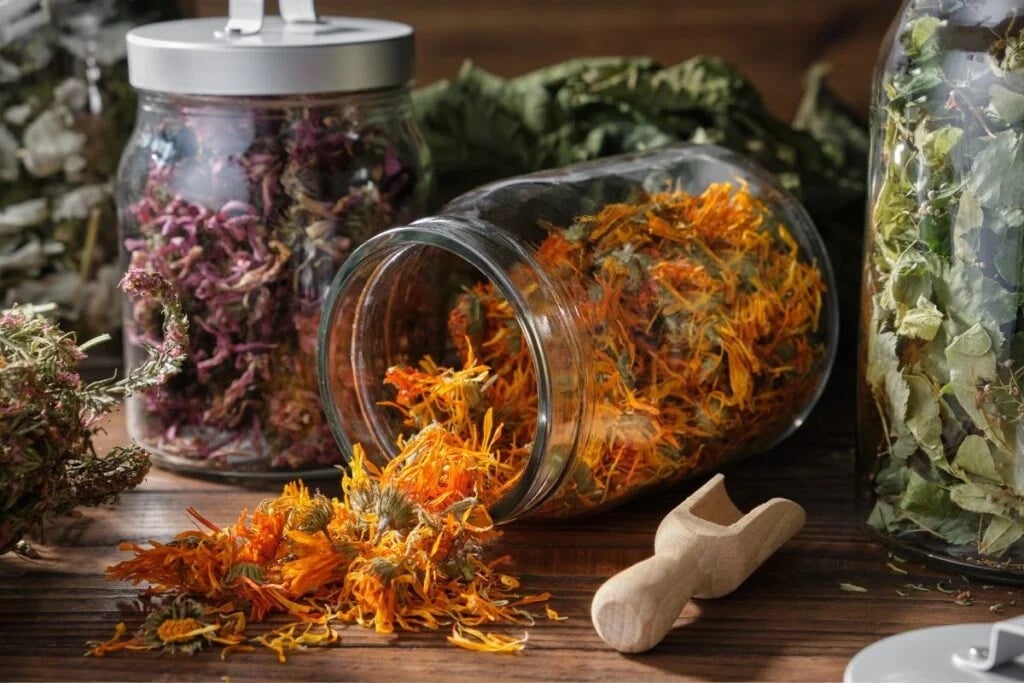Let’s familiarize ourselves with mint tea, made from the mint plant (Mentha), a member of the Lamiaceae family. It is an annual or perennial herb with a strong scent. The leaves grow opposite on stems and twigs; the flowers are small and clustered in bell-shaped inflorescences. The plant produces nut fruits. Mint is best known for its cooling properties. Housekeepers or chefs use this fresh and dried herb as a spice in teas, alcoholic beverages, salads, and desserts. Some of the benefits of mint tea and herbs are derived from their use in food. But there are also mint tea benefits for skin and hair care.
Nutritional Composition of Mint
Even though mint is consumed in small quantities, it still contains several nutrients. 14 grams of mint consist of 1 gram of fiber, 12% RDA of vitamin A, 9% RDA of iron, 8% RDA of manganese, and 4% RDA of folic acid. It is challenging to eat 14 g (1/3 cup) of mint, but it is possible to use this amount in some recipes. You can incorporate mint into the daily diet by adding it to desserts, smoothies, and water as a garnish or ingredient in a meal. Mint tea is probably the most popular way of consuming mint.
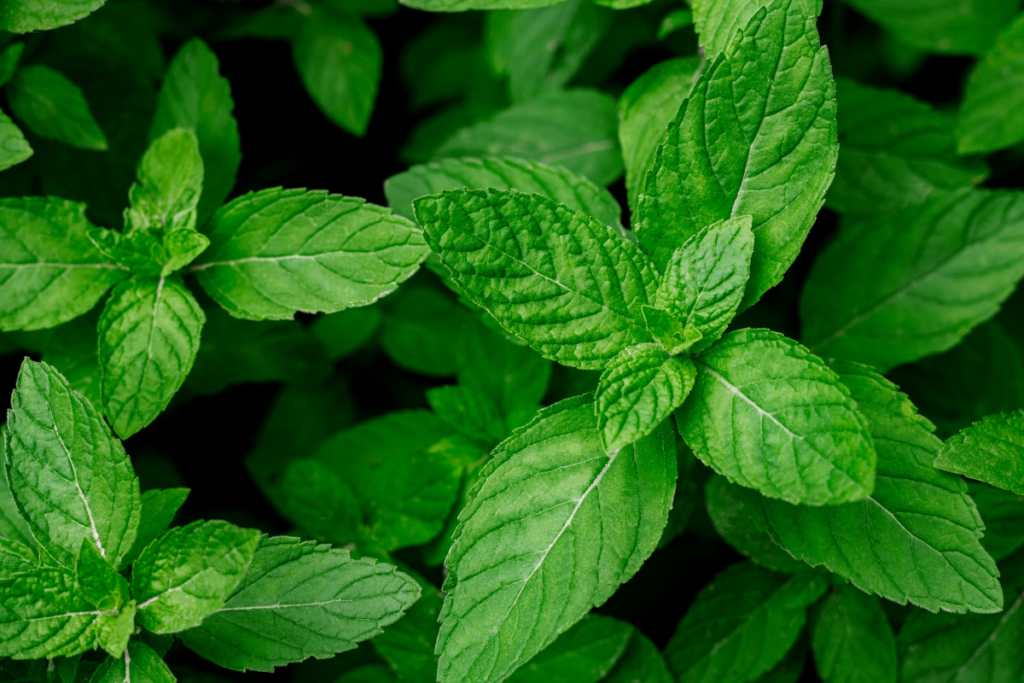
Mint Tea Benefits
- This tea is beneficial for digestive problems. Mint is thought to activate bile, which promotes digestion and lowers cholesterol. Mint oil is a more intensive remedy; it also has antiseptic and antibacterial properties that ease indigestion and stomach infections, while methanol acts as a spasm reliever.
- It is one of the rich sources of iron, potassium, and manganese, which increase hemoglobin levels in the blood (when taken in larger quantities in capsules).
- Applying strong mint tea (or water with a drop of essential oil) to the nipples immediately after breastfeeding can help prevent nipple and areola cracks, thus reducing breastfeeding pain.
- In the case of a runny nose, the decongestant in mint helps to remove mucus. If you suffer from chronic coughs, mint tea eases breathing and reduces throat irritation.
- Mint tea improves digestion, thus stimulating metabolism and helping to lose weight.
- Mint treats skin problems and scars due to its strong antibacterial, antifungal, and anti-inflammatory properties. Vitamin A and the salicylic acid in mint tea control sebum secretion and help treat acne.
- It may relieve morning sickness during pregnancy.
- Strong mint tea compresses can slightly reduce pain.
Health Benefits of Mint Products
- The leaves of these medicinal plants are rich in vitamins and antioxidants, which boost immunity and help protect cells from damage. Mint leaves can also prevent the formation of tumors due to their inhibiting properties for certain enzymes.
- Mint also contains 53 individual compounds with anti-allergic properties. This means that eating mint can help treat different types of allergies.
- Mint is an excellent source of carotene and antioxidants to stimulate hair growth and prevent dandruff and hair loss.
- The cosmetic industry uses mint leaf extract as a treatment and prevention of acne. Mint is rich in natural antioxidants and menthol and is an excellent cleanser, toner, moisturizer, astringent, and emollient for dry and itchy skin.
- Fresh mint leaves and products can help refresh breath due to their bactericidal properties.
- Mint can help with irritable bowel symptoms such as stomach pain, gas, bloating, and bowel problems. The oil contains a compound called menthol, which relaxes digestive tract muscles.
- Mint is also used effectively in aromatherapy. Its fresh and robust scent can help to overcome stress and calm the mind. It improves brain function, memory, and alertness and reduces fatigue.
- Mint is recommended for asthma sufferers as it relaxes and relieves chest congestion. Mint leaves, taken daily, can have a calming effect on asthma.
- Menthol can protect against stomach ulcers caused by medication and alcohol abuse.

Different Effects of Mint Tea on Women and Men
Mint has a double effect on hormone balance. It stimulates an increase of the hormone estrogen and a decrease in testosterone levels, which is why mint tea:
- reduces male libido
- increases female libido
Depending on the situation, you can try drinking more mint tea to increase or decrease your libido. There is no exact limit to drinking this tea and getting the effect. Also, scientists should investigate more research to prove these assumptions.
Also, women with decreased hormone estrogen (which often happens at an older age) have body hair growing in areas of the body that men have, such as the face. Regular use of mint tea or mint supplements could help reduce this problem.
How to Prepare Mint Tea?
It is simple to make mint tea at home. Add a few fresh or dried mint leaves to a cup (the number of leaves should be about the strength of the tea you want) and steep them in boiling water for about 10 minutes until they have set.
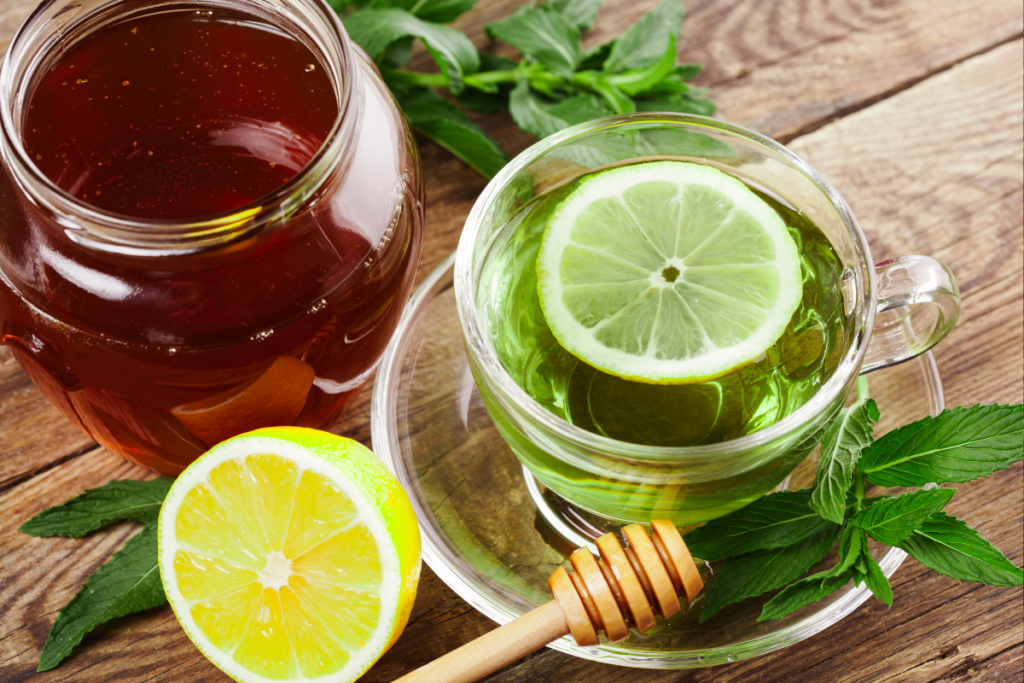
Lemon and Mint Tea Benefits for Slimming
Mint is particularly beneficial for slimming the belly and shaping the waist. Mint helps to eliminate fat and speeds up gastric emptying. Lemon and mint tea is a delicious herbal tea that detoxifies, boosts immunity, and rejuvenates your body.
You need:
- A quarter cup of fresh mint leaves (can be dried)
- 1 cup of hot water
- a quarter of a lemon
- Honey or another sweetener to flavor the tea
Preparation:
- Pour boiling water into a cup with added mint leaves and steep for about 10 minutes.
- Add the lemon juice to the cooled tea.
- You can add a little honey to sweeten.
- Enjoy.
You can consume this tea in large quantities. Lemon and mint tea is a brilliant way to get vitamins and minerals for slimming and overall health. You will notice positive changes in your skin and hair over time.
Mint Tea Benefits for Bath
A mint-scented bath will relieve the stress and tension of the day, calm you down, and reduce the signs of depression.

Mint Salt for Bath
You need:
- 1 tablespoon of baking soda
- 2 cups of Epsom salt
- 3-4 drops of mint essential oil (can also be peppermint or mixed with your favorite scent)
- jar for the salt
Preparation process:
- Place baking soda, Epsom salt, and mint essential oil (and other essential oils if you choose to use them) in a small bowl.
- Mix the ingredients well.
- Pour the salt into a sealed container.
- Add to the bath as needed.
- You can store this mint-scented salt for up to 6 months.
Mint Decoction for Bath
You can easily prepare a mint decoction for your bath: 1 cup of mint leaves in hot water, and steep the herbs for about 10 minutes. Then, you can pour the decoction into the bathtub. You can also soak your hair in the bath water.
Hair Mask with Mint and Banana
A hair mask with mint and banana is best suited for restoring weakened, limp hair. It will nourish, shine, and protect your hair from the harmful effects of the environment.
You need:
- 2 ripe bananas
- 1-2 handfuls of mint leaves
- 1 tablespoon coconut oil
- 15 drops of essential oil (lavender, rosemary, lemongrass, etc.)
Preparation and application:
- Grind the bananas and mint leaves in a food processor to make a smooth puree.
- Add coconut oil and your favorite scented essential oil to the puree.
- Stir well and massage into your hair from root to tip. Massage the scalp with gentle movements to activate blood circulation.
- Leave the mask on for about 25-30 minutes and rinse off.
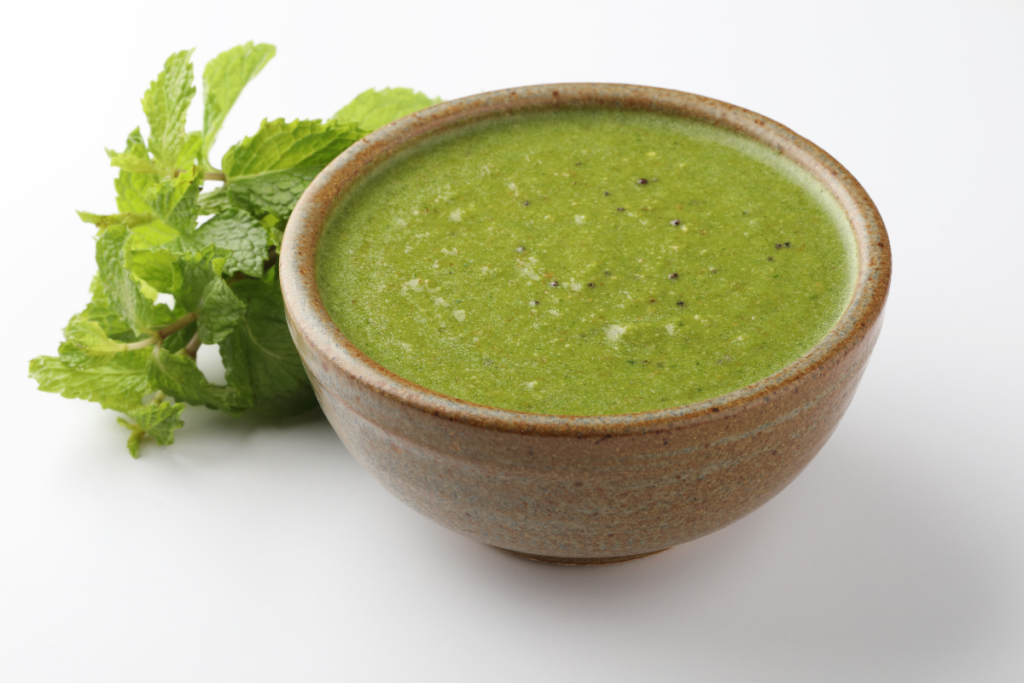
Mask with Mint and Lemon Juice
Use this mint and lemon hair mask for oily and flaky hair.
Grind enough fresh mint leaves to make a few tablespoons of puree, add a tablespoon of lemon juice, and stir well. Apply this mask to the hair and scalp. Wash off after 10 minutes.
Hair Mask with Mint and Aloe Vera
The mint and aloe vera hair mask is suitable for all hair types and all hair problems. If your hair is long and lush, you can double the quantity next time you make the mask.
You need:
- 3 tablespoons of aloe vera gel. You can buy it in the shops, but if you grow aloe vera on your windowsill, use the thicker adult branches. Peel the aloe vera so that only the transparent part of the aloe vera without the husk remains.
- 2 handfuls of fresh mint leaves.
- 1 tablespoon coconut or olive oil.
Place all the ingredients in a bowl and grind with a food processor until it becomes a smooth puree. Apply this mask from the roots to the tips of the hair, massaging it into the scalp. Leave on the mint mask for 15 minutes and rinse off.
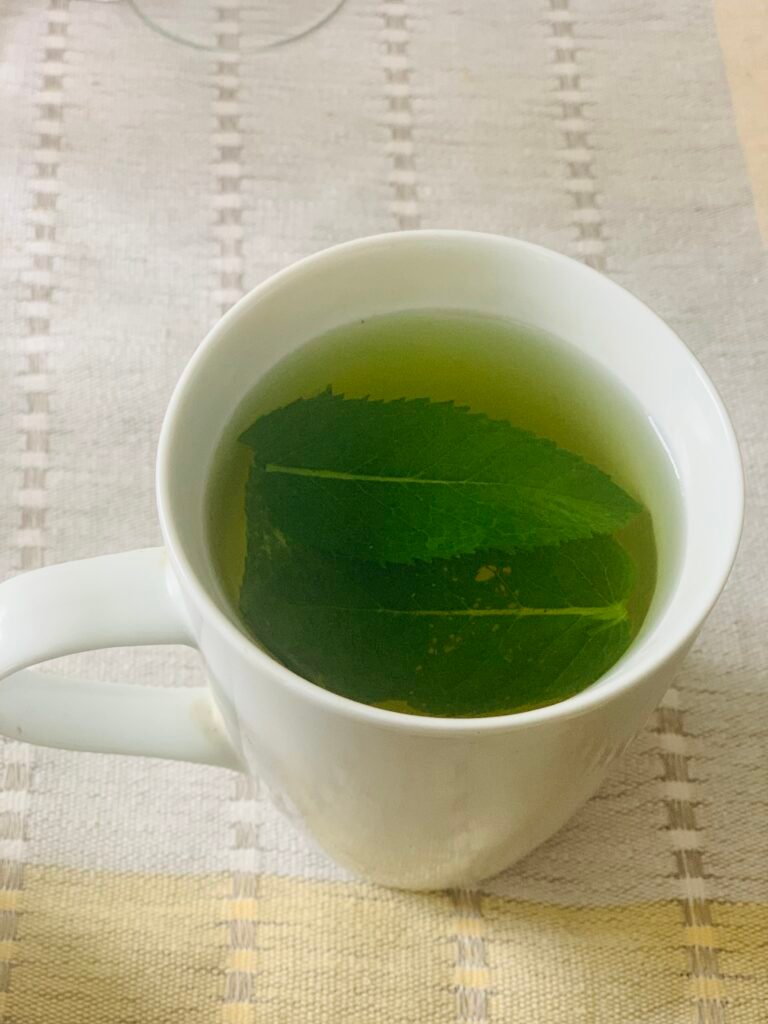
Side Effects of Mint
Mint is generally safe to consume, but still not recommended for some people:
- People with gastroesophageal reflux disease should use as little mint as possible to avoid irritating their stomachs.
- Although mint tea helps with nausea and appetite during pregnancy, it should not be overused. Too much mint tea can cause headaches and even miscarriage.
- Mint tea is not recommended when breastfeeding as it can inhibit milk production. However, it is useful when you are about to stop breastfeeding; mint will help to reduce lactation.
Sources:
- https://www.e-lactancia.org/media/papers/Peppermint-MentaBF-Nipple-IraJNeon2020.pdf
- https://openurl.ebsco.com/EPDB%3Agcd%3A14%3A5481790/
- https://www.preprints.org/manuscript/202212.0273/v1
- https://www.webmd.com/diet/mint-tea-health-benefits
- https://pubmed.ncbi.nlm.nih.gov/34421614/
Associative photos from © Canva.
